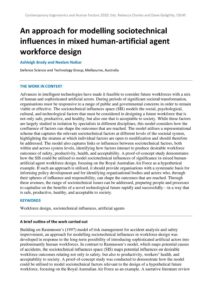| Document | Author Ashleigh Brady and Neelam Naikar |
| Abstract Advances in intelligent technologies have made it feasible to consider future workforces with a mix of human and sophisticated artificial actors. During periods of significant societal transformation, organisations must be responsive to a range of public and governmental concerns in order to remain viable or effective. The sociotechnical influences space (SIS) models the social, psychological, cultural, and technological factors that must be considered in designing a future workforce that is not only safe, productive, and healthy, but also one that is acceptable to society. While these factors are largely studied in isolation by specialists in different disciplines, this model considers how the confluence of factors can shape the outcomes that are reached. The model utilises a representational scheme that captures the relevant sociotechnical factors at different levels of the societal system, highlighting the stratum at which individual factors are open to modification and should therefore be addressed. The model also captures links or influences between sociotechnical factors, both within and across system levels, identifying how factors interact to produce desirable workforce outcomes of safety, productivity, health, and acceptability. A proof-of-concept study demonstrates how the SIS could be utilised to model sociotechnical influences of significance in mixed human-artificial agent workforce design, focusing on the Royal Australian Air Force as a hypothetical example. If such an approach is utilised, it should provide organisations with a systematic basis for informing policy development and for identifying organisational bodies and actors who, through their spheres of influence and responsibility, can shape the outcomes that are reached. Through these avenues, the range of sociotechnical issues can be addressed, preparing people and processes to capitalise on the benefits of a novel technological future rapidly and successfully—in a way that is safe, productive, healthy, and acceptable to society. |

